|
|
|
Sort Order |
|
|
|
Items / Page
|
|
|
|
|
|
|
| Srl | Item |
| 1 |
ID:
095648
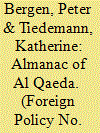

|
|
|
| 2 |
ID:
113532
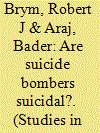

|
|
|
|
|
| Publication |
2012.
|
| Summary/Abstract |
Recent work by Ariel Merari argues that, while certain contextual factors increase the probability of suicide attacks, they do not explain why particular individuals become suicide bombers. Merari seeks to demonstrate that suicide bombers are motivated by an unusually high prevalence of depression and suicidal tendencies. This article questions the representativeness of Merari's sample. It raises the possibility that interviewer and contextual effects contaminated his findings. Finally, it presents evidence that challenges Merari's conclusions. This evidence is drawn from interviews with immediate family members and close friends of a 25 percent random sample of Palestinian suicide bombers who conducted attacks between 2000 and 2005. Based on their analysis, the authors question the value of a psychological approach to the study of suicide bombers and assert the importance of focusing on the political and social roots of the phenomenon.
|
|
|
|
|
|
|
|
|
|
|
|
|
|
|
|
| 3 |
ID:
090671
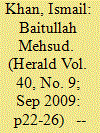

|
|
|
| 4 |
ID:
080340
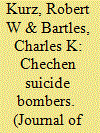

|
|
|
|
|
| Publication |
2007.
|
| Summary/Abstract |
U.S. military commanders and others in the defense community are concerned that militant Chechens, trained in suicide bombing and extremist tactics, are available to support Taliban elements in Afghanistan today. In reality, the relationship between these two groups is minimal and there is little likelihood of substantive cooperation between them. This position becomes clear after a brief review of Chechnya's history regarding Islam, its extremist groups, and its chronology of suicide bombings.
|
|
|
|
|
|
|
|
|
|
|
|
|
|
|
|
| 5 |
ID:
091193
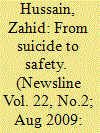

|
|
|
| 6 |
ID:
094867
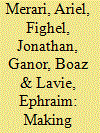

|
|
|
|
|
| Publication |
2010.
|
| Summary/Abstract |
Knowledge about the ways in which suicide attacks are recruited and prepared and on the motivation of suicide bombers and the factors that influence the decisions of organizers of suicide attacks has so far been sketchy and sporadic, derived mostly from media sources. In this study, 15 Palestinian would-be suicides and 14 organizers of suicide attacks participated in semi-structured interviews designed to fill this lacuna. The paper focuses on the self-reported feelings and behavior of the suicide bombers from recruitment to dispatching, as well as on the organizers' self-reported views and decisions concerning suicide attacks.
|
|
|
|
|
|
|
|
|
|
|
|
|
|
|
|
| 7 |
ID:
081345


|
|
|
|
|
| Publication |
2008.
|
| Summary/Abstract |
This article analyzes the motivations and recruitment of female suicide terrorists. Biographical accounts of 30 female and 30 male suicide terrorists were coded for method of recruitment, motivation for attack, and outcome of attack. A log-linear analysis found that female suicide terrorists were motivated more by Personal events, whereas males were motivated more by Religious/nationalistic factors. Females were equally likely as males to be recruited through peer influence, exploitation, or self promotion, whereas males were more likely to be recruited as a result of religious persuasion. The results highlight the need for continued research into female terrorism
|
|
|
|
|
|
|
|
|
|
|
|
|
|
|
|
| 8 |
ID:
144897
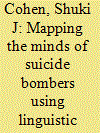

|
|
|
|
|
| Summary/Abstract |
This study proposes a novel methodology for the study of the mindset, motives, and cognitive style of individual suicide bombers in Israel/Palestine, based on a comprehensive corpus of personal farewell letters (which also serve as last wills) that were written by suicide bombers to their family during the Second Intifada (2000–2006). To avoid privileging certain a priori sentiments, motivations, or concepts over others, I used a programmatic “bottom-up” sequence of quantitative psycholinguistic procedures, in which prominent themes or concepts from one level of analysis are further qualified and contextualized in the next. This afforded a minimally biased view of the cognitive content of Palestinian suicide bombers, including the sentiments, motivations, and concepts that they were more preoccupied with, and the context in which these ideas were expressed. The results are largely consistent with theories of political violence that place pro-social sentiments at the forefront of the motivations for suicide terrorism, and paramount to antisocial sentiments such as hatred and revenge. Since the linguistic patterns that were uncovered in this analysis cannot be controlled consciously, and the farewell letters of suicide bombers have rarely been rigorously analyzed linguistically, this study may provide an unprecedented glimpse into the cognitive style and content of individual suicide bombers—a glimpse that is minimally biased by political, partisan, or sectarian preconceptions.
|
|
|
|
|
|
|
|
|
|
|
|
|
|
|
|
| 9 |
ID:
076658
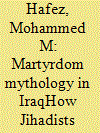

|
|
|
| 10 |
ID:
079389


|
|
|
|
|
| Publication |
Princeton, Princeton University Press, 2004.
|
| Description |
viii, 200p.
|
| Standard Number |
0691126151
|
|
|
|
|
|
|
|
|
|
|
|
Copies: C:1/I:0,R:0,Q:0
Circulation
| Accession# | Call# | Current Location | Status | Policy | Location |
| 052670 | 303.625/REU 052670 | Main | On Shelf | General | |
|
|
|
|
| 11 |
ID:
094866
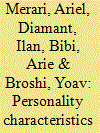

|
|
|
|
|
| Publication |
2010.
|
| Summary/Abstract |
This is a report of a direct psychological examination of suicide, or "martyrdom" terrorists and of organizers of martyrdom attacks. Assessments of the personality of self-martyrs have so far relied on biographical material drawn from secondary sources. In the absence of direct psychological examinations, the debate on the existence of distinctive personality factors among suicide terrorists has so far remained at the hypothetical level. This study subjected failed Palestinian suicide terrorists, a control group of non-suicide terrorists, and a group of organizers of suicide attacks, to clinical psychological interviews and tests. Significant differences were found between suicide and non-suicide terrorists and between these two groups and the organizers of martyrdom attacks. Two main personality styles were found among the would-be suicides. Members of this group had a significantly lower level of ego strength than the organizers of martyrdom attacks. Most of the would-be martyrs displayed a dependent and avoidant personality style, a profile that made them more amenable to group, leader, and public influence. Others were assessed as having an impulsive and emotionally unstable style. Some of the would-be martyrs but none of the control and organizers groups' participants displayed sub-clinical suicidal tendencies. Significantly more martyr than control group members displayed symptoms of depression.
|
|
|
|
|
|
|
|
|
|
|
|
|
|
|
|
| 12 |
ID:
097944
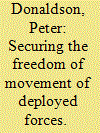

|
|
|
| 13 |
ID:
053541


|
|
|
|
|
| Publication |
New Brunswick, Transaction Publishers, 2004.
|
| Description |
xiv, 246p.
|
| Standard Number |
0765802503
|
|
|
|
|
|
|
|
|
|
|
|
Copies: C:1/I:0,R:0,Q:0
Circulation
| Accession# | Call# | Current Location | Status | Policy | Location |
| 048556 | 303.625/SHA 048556 | Main | On Shelf | General | |
|
|
|
|
| 14 |
ID:
113533


|
|
|
|
|
| Publication |
2012.
|
| Summary/Abstract |
In this issue of Studies in Conflict & Terrorism Brym and Araj published a critique of the study of would-be suicide bombers that the present author carried out with colleagues. Brym and Araj's point of departure was their allegation that the article attributed the Palestinian suicide attacks mainly to depression and suicidality of the suicide bombers. Their critique was aimed at disputing this alleged attribution. For this end they criticized various aspects of the methodology used in the study and described their own study which, in their view, challenges the author's findings. In this response article the author shows that Brym and Araj's critique is based on false allegations, cannibalized quotes, and distorted interpretation of the published descriptions of the study. Their methodological criticism alleging biased psychological assessment is invalid because it ignores the use of a control group and a "blind" reliability check of the diagnoses. Brym and Araj's own study suffers from serious methodological problems: venturing a psychological assessment on the basis of a brief interview with family members, conducted and analyzed by persons unqualified for making clinical psychological diagnoses, without using a standard battery of psychological tests. Brym and Araj did not use a control group and a "blind" reliability check of their diagnoses.
|
|
|
|
|
|
|
|
|
|
|
|
|
|
|
|
| 15 |
ID:
115358
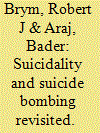

|
|
|
|
|
| Publication |
2012.
|
| Summary/Abstract |
Ariel Merari purports to demonstrate a tendency on the part of suicide bombers to be motivated by depression and suicidal tendencies. However, he misconstrues the present authors' critique of his work and misinterprets their research. By clarifying both issues, this article seeks to substantiate three claims: (1) Merari's sampling procedure precludes generalization; (2) interviewer and contextual effects probably bias his findings; (3) evidence challenges his inferences.
|
|
|
|
|
|
|
|
|
|
|
|
|
|
|
|
| 16 |
ID:
062271


|
|
|
|
|
| Publication |
London, Pluto Press, 2005.
|
| Description |
vi, 258p.
|
| Standard Number |
0745322832
|
|
|
|
|
|
|
|
|
|
|
|
Copies: C:1/I:0,R:0,Q:0
Circulation
| Accession# | Call# | Current Location | Status | Policy | Location |
| 049714 | 297.72/KHO 049714 | Main | On Shelf | General | |
|
|
|
|
| 17 |
ID:
134991
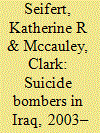

|
|
|
|
|
| Summary/Abstract |
Extending data reported by Mohammed Hafez in 2007, we compiled a database of 1,779 suicide bombers who attempted or completed attacks in Iraq from 2003 through 2010. From 2003 through 2006, monthly totals of suicide bombers show a pattern different from the pattern of non-suicide insurgent attacks, but from 2007 through 2010 the two patterns were similar. This biphasic pattern indicates that suicide attacks sometimes warrant separate analysis but sometimes are just one tactic in a larger envelope of insurgent violence. We also show that only 13 percent of suicide bombers targeted coalition forces and international civilians, primarily during the early years of the conflict, whereas 83 percent of suicide bombers targeted Iraqis (civilians, members of the Anbar Awakening Movement, Iraqi security forces, and government entities) in attacks that extended throughout the duration of the insurgency. These results challenge the idea that suicide attacks are primarily a nationalist response to foreign occupation, and caution that “smart bombs” may be more often sent against soft targets than hard targets. More generally, our results indicate that suicide attacks must be disaggregated by target in order to understand these attacks as the expression of different insurgent priorities at different times.
|
|
|
|
|
|
|
|
|
|
|
|
|
|
|
|
| 18 |
ID:
078396


|
|
|
|
|
| Publication |
Westport, Praeger Security International, 2007.
|
| Description |
xvii, 202p.
|
| Standard Number |
0275992608
|
|
|
|
|
|
|
|
|
|
|
|
Copies: C:1/I:0,R:0,Q:0
Circulation
| Accession# | Call# | Current Location | Status | Policy | Location |
| 052583 | 363.32511/COO 052583 | Main | On Shelf | General | |
|
|
|
|
| 19 |
ID:
106555


|
|
|
| 20 |
ID:
077540


|
|
|
|
|
| Publication |
2007.
|
| Summary/Abstract |
This article traces the pathologization of suspected terrorists held captive at the U.S. military base in Guantánamo Bay, Cuba. The occurrence of several reported suicide attempts among the detainees provided "proof" for their captors that terrorists are indeed fanatical madmen. These same reports of suicide attempts, however, were contradictorily diagnosed by human rights and humanitarian organizations as evidence of psychological deterioration induced by prolonged detention. What is notable in this diagnostic competition over what, exactly, afflicts the detainees is that both advocates and resisters to the detentions pathologized the detainees by chalking up the suicide attempts to their purportedly impaired psyches. This is significant because the pathologization of the detainees is one condition of possibility for their excision from the global body politic. Authoritarian practices, such as the incarceration of the "mad" and the detention of "suspected terrorists," are theorized as integral to global liberal governance, which divides up populations, and subjects those deemed mad, deviant, or dangerous to coercive measures in the name of order, security, and liberty. The article concludes with a consideration of the ways in which international relations (IR) could be more attentive to the operation of the "psy" disciplines in the conduct of international affairs
|
|
|
|
|
|
|
|
|
|
|
|
|
|
|
|
|
|
|
|
|